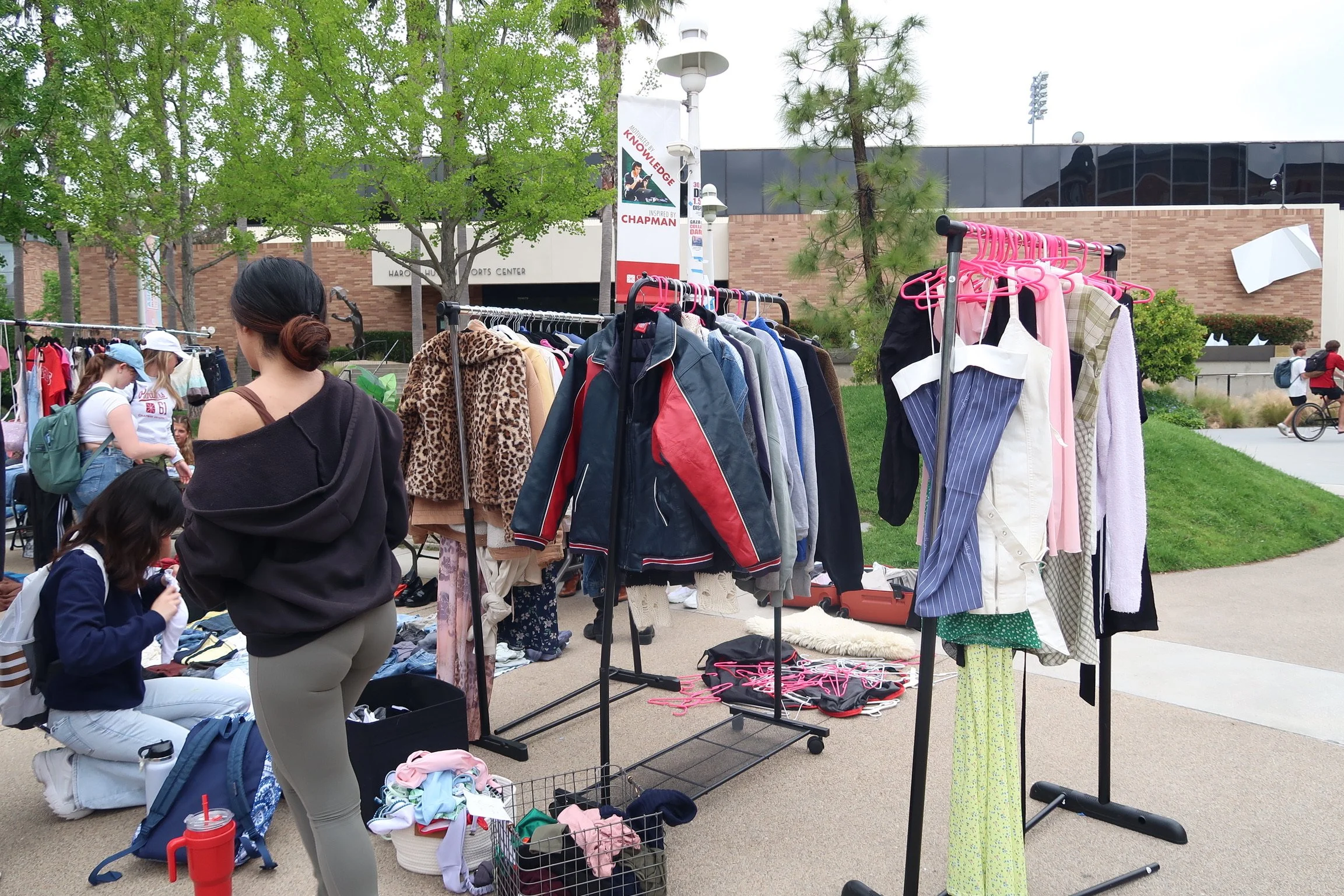Chapman Thrift Club is the next victim of Chapman’s recent enforcement of current policies
Photo from previous Thrift Club event; Photo by Makenna Kunimura
Many clubs or organizations on campus have faced issues with Chapman’s current policy restrictions on public displays, protests and noise. This week the policies affected Chapman Thrift Club, where Chapman is cracking down on financial transactions on campus. The club’s thrift event which once was regarded as an opportunity for students to make some profit off of a sustainable practice, has now been changed to a clothing swap.
“I met with a student organization faculty member and a member from Events Operations and they told us we are not allowed to sell anymore,” said Lily O’Day, junior co-president of Chapman Thrift Club. “They said that technically Chapman is a non-profit organization institution and that they are tax-exempt, citing it as a legal problem.”
Chapman Thrift Club has existed since 2021 and has been able to successfully sell used clothes for profit in the Attallah Piazza until this 2024 semester.
“We work every day on this and we have been trying to get an appointment with Jerry Price or trying to secure an event off campus. I have been hearing so many mixed things from different faculty and staff and it seems that there is no communication between the departments,” said O’Day.
Nicole Kavros, fundraising director for Kappa Alpha Theta sorority and junior journalism major, shared that one of their most popular events, Theta Marketplace, was similarly not allowed to occur this semester. Theta Marketplace is an event that the sorority puts on every year in order to raise money for their philanthropy: Court Appointed Special Advocates (CASA).
“Thetas would volunteer their talents in baking, crafting and donating their clothes for sale at cheap prices and we would donate all of the money to our philanthropy,” said Kavros. “In the past, this has been something that has worked without any issues, and we were able to host Theta Marketplace on campus in the Piazza. But this year, when we tried to organize this event, we were told by event operations that we can't sell anything in the Piazza.”
When Kavros and the rest of the Theta sorority wondered why there was this sudden change with an event that they have been hosting for several semesters, the administration informed them that these rules have always been in place but that they are only recently beginning to be enforced.
“Even when we told them that it was for philanthropic reasons, they said we can't sell anything. I just think that it is an unfair rule that negatively affects a lot of clubs and organizations. We are trying to fundraise for a worthy cause, but Chapman doesn't want us to sell anything, and it's really disappointing to a lot of people,” added Kavros.
Tessa Jones, vice president of Events Operations, said Event Operations was not involved in the decision.
“University administration consulted with tax law experts who referred to the Property Tax Welfare Exemption — part of California's legislation regarding tax-exempt properties,” said Jones. “While we are actively seeking further clarity from relevant authorities regarding what types of activities are permissible on university property, we’ve been pleased to see the event continue in its current swap format, where students can exchange items. This format ensures compliance with existing regulations.”
Moreover, when asked if the city of Orange was involved in this decision, Jones said that they were not.
“The city of Orange is not involved in these decisions,” Jones said. “However, Chapman University’s policies do require a vendor agreement and seller’s permit for any sales-based activities on campus that are not directly related to the university’s academic mission. These guidelines ensure that all events on campus comply with both university policies and local regulations.”
The Panther reached out to Chapman’s Legal Affairs Office regarding this new enforcement of policies, but they did not respond to a request for comment.
Other organizations on campus, such as Chapman Radio, The Collective and the Rage Magazine, have been flagged as well.

